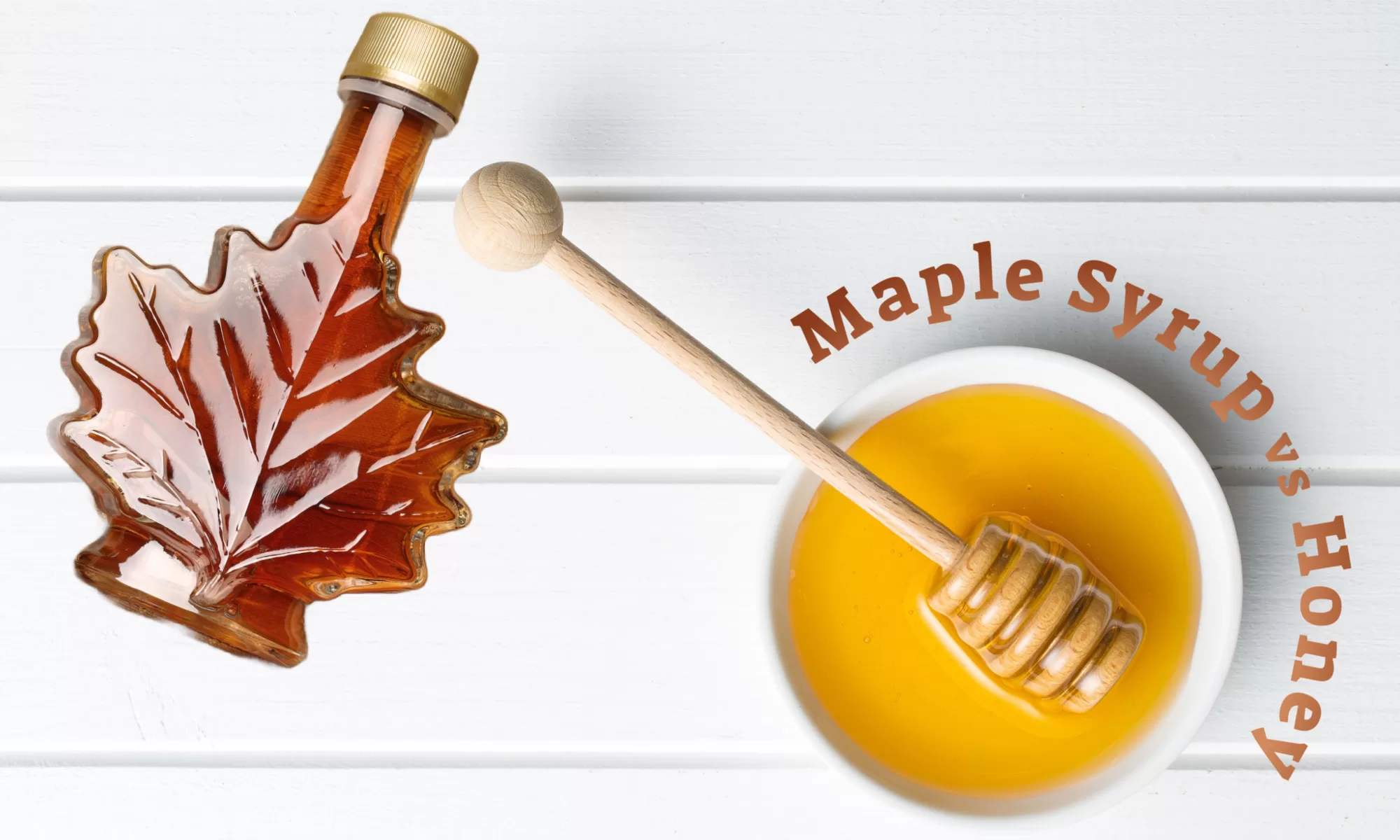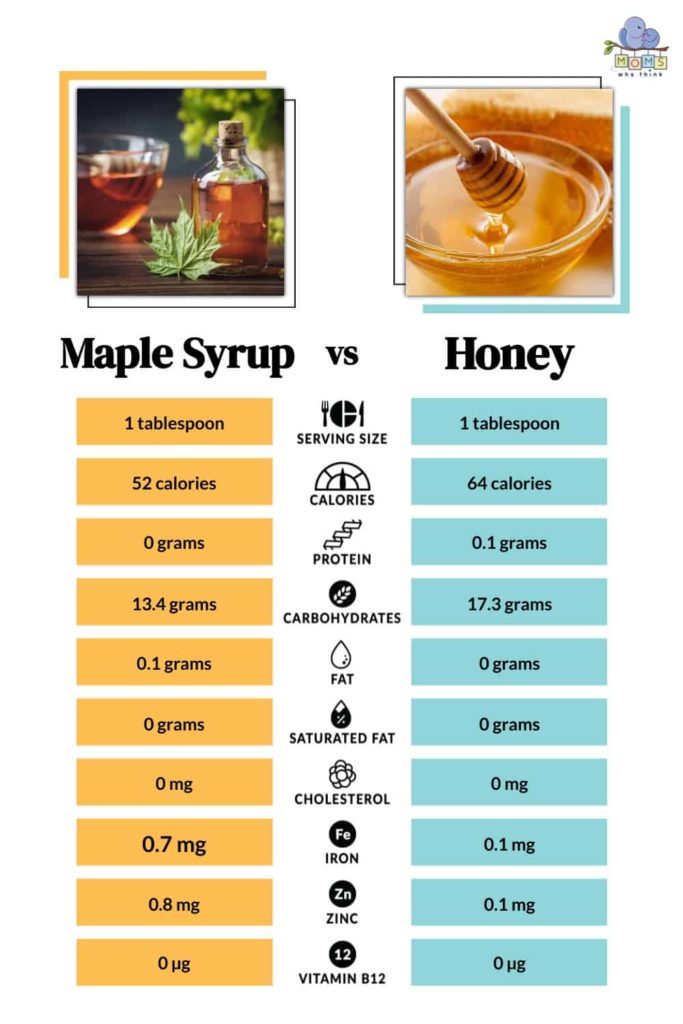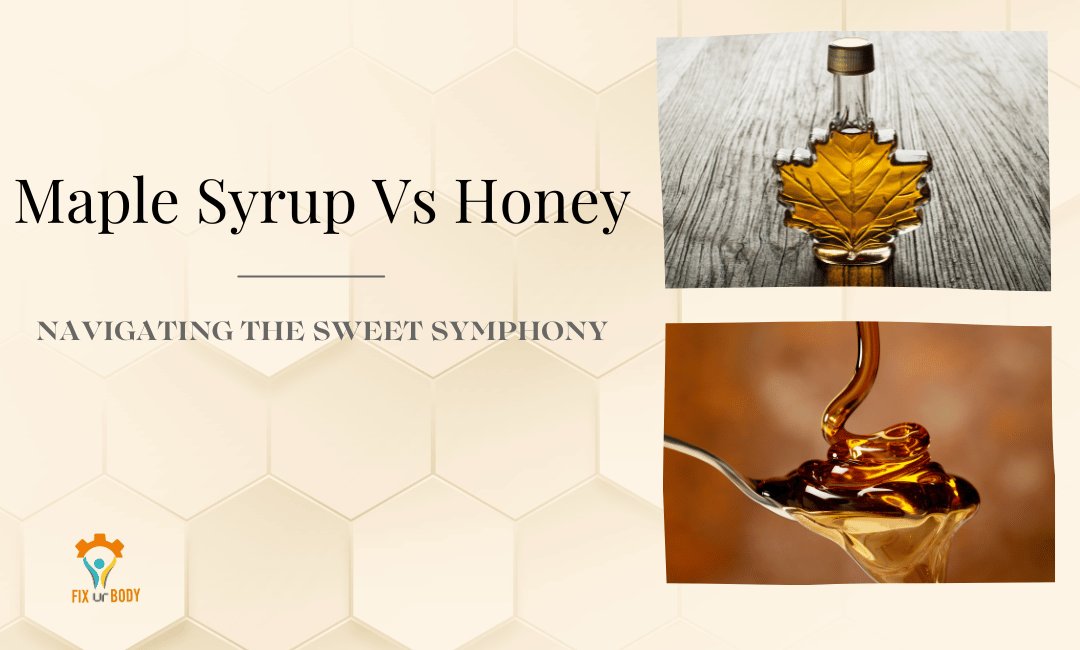Have you ever stood in front of your breakfast spread, torn between choosing maple syrup vs honey? Join the club! Let’s chat about these sweet sidekicks and determine your perfect match.
Table of Contents
Origin of Maple Syrup Versus Honey
- The Origin of Maple Syrup: Now, let’s venture into the world of maple syrup, a delicious treat with a different origin story. Unlike honey, maple syrup doesn’t involve buzzing insects but rather the magnificent maple trees of North America. To harvest this liquid gold, one taps into the sap of maple trees and then boils it down to a thick, caramelized sweetness. The process is an age-old tradition passed down through generations. Maple syrup, by nature, is entirely vegan, as it’s sourced solely from plant-based sap. However, it’s essential to be aware that not all maple syrup is created equal, and sometimes, issues with the manufacturing process can make it unsuitable for a vegan lifestyle, such as the use of animal fats. So, the next time you pour that delicious drizzle over your pancakes, remember the sweet journey that begins high up in the maple trees of the North American forests.
- The Origin of Honey: Picture yourself in the heart of a bustling garden, where bees are working their tiny wings tirelessly among vibrant flowers. This charming scene is where the magic of honey begins. In the wild, bees produce honey as their way of preparing for winter or when food becomes scarce. They diligently collect nectar from various flowers and then, with the help of their special enzymes, transform this nectar into the golden goodness we all know and love. The process involves changing the texture and storage duration of the nectar. Back at the hive, bees pass the honey from one mouth to another until it finally finds its place in the honeycomb. To ensure its preservation, bees use their wings to circulate air within the honeycomb, evaporate excess water, condense the honey, and seal it with a sweet, protective layer. Honey’s flavor and texture can vary depending on the flower species the nectar was sourced from, giving us a delightful array of honey varieties to savor.
Glycemix Index: Maple Syrup Vs Honey
First, let’s talk about the glycemic index of Maple syrup vs Honey – not as scary as it sounds, I promise! It’s like a speedometer for how fast a food cranks up your blood sugar. Pretty important stuff! Especially if you’re riding the health train.
Maple Syrup:
Maple syrup’s got the slow dance moves – its glycemic index is lower, meaning it won’t send your blood sugar on a rollercoaster. It’s like a gentle, steady hand leading you through the blood-sugar dance floor.
Honey:
Honey’s more of a salsa dancer; it’s got a higher glycemic index, giving you that quick energy hit. But be ready for a snappy rhythm – your blood sugar might spike faster than a salsa beat.
Consider this when comparing Maple Syrup vs Honey:
Seventeen distinct honey varieties boast an average glycemic index of 58, while maple syrup shines with a glycemic index of 54. Here’s the catch – honey shines brightest in the realm of low-fat diets, while maple syrup finds its calling in the realm of low-calorie, low-carb, and low-glycemic-index dietary plans. Moreover, when we compare serving sizes, we discover a subtle contrast. Honey’s serving size tends to be on the modest side, owing to its thicker consistency compared to maple syrup.

Healthier Buzz – Maple Syrup vs Honey
Now, let’s talk about health perks. both bring something to the table. Think of them as your sweet allies, each with its superpowers.
Let’s find out what healthy vitamins, mineral and antioxidants are found in maple syrup vs honey nutrition wise.
Navigate Maple Syrup:
Maple syrup packs minerals like manganese and zinc. Plus, it’s got antioxidants – those superhero molecules that fight off the bad guys causing inflammation. So, it’s like a spa day for your insides.
Health Benefits of Maple Syrup:
- Rich in Antioxidants:
- Pure maple syrup contains 24 different antioxidants.
- Darker maple syrups offer even more antioxidants.
- Antioxidants reduce free radical damage and inflammation, guarding against chronic diseases.
- Low Glycemic Index:
- Maple syrup has a glycemic index of 54, as discussed before, making it a better choice for blood sugar control than honey (index of 58) or table sugar (index of 65).
- Moderation is essential to avoid excessive sugar intake.
- Potential Cancer Protection:
- Maple syrup contains antioxidants that protect against DNA damage and cancerous mutation.
- Darker maple syrup varieties may suppress cancer cell growth more effectively.
- Skin Health:
- Maple syrup can reduce skin inflammation, redness, and irritation.
- Digestive Health:
- It is more digestive-friendly and can help maintain a healthier gut.
- Rich in Vitamins and Minerals:
- Maple syrup contains essential nutrients like potassium, calcium, zinc, and manganese.
- These minerals support various bodily functions, including immune function, digestion, and overall health.
Navigate Honey:
Honey’s got its fan club for being a natural healer. It’s got antibacterial and antimicrobial tricks up its sleeve, making it your sweet knight in shining armor against pesky infections. And those antioxidants? They’re like your immune system’s personal cheerleaders.
Health Benefits of Honey:
- Weight Loss Aid:
- Honey helps burn body fat, even during sleep.
- Consuming a tablespoon of honey before bedtime or with warm water in the morning boosts metabolism, aiding in weight loss.
- Honey is a valuable addition to low-fat diets.
- Immune System Booster:
- Rich in therapeutic properties, honey is a natural remedy for sore throats and illnesses caused by viruses, bacteria, and fungi.
- Packed with antioxidants that enhance immunity.
- Skin and Face Nourishment:
- Honey’s hydrating and nourishing qualities make it an excellent moisturizer for dry skin.
- It can treat wounds, bruises, cuts, and burns due to its natural antiseptic properties.
- Honey masks are popular for improving skin tone and achieving beautiful skin.
- Memory Enhancement:
- Honey can improve memory and brain function, reducing metabolic stress and aiding in memory retention.
- Its antioxidant properties benefit the brain circulation.
- Cough Remedy:
- Honey is an effective home remedy for dry and wet coughs, soothing throat inflammation.
- It’s a recommended natural cough remedy for children, promoting better sleep.
- Dandruff Treatment:
- Honey nourishes and hydrates dry hair, making it soft and silky.
- Wound Treatment:
- Honey’s antibacterial, antifungal, and antioxidant qualities make it effective in treating wounds and preventing infections.
- It can kill bacteria and accelerate the healing process.
- Sleep Aid:
- A warm honey drink before bedtime promotes relaxation and better sleep quality.
- Sinus Relief:
- Honey’s natural antibacterial properties help treat sinus problems by reducing inflammation, calming the throat, and boosting the immune system.
- Gum Disease Treatment:
- Honey’s antibacterial and anti-infection characteristics can assist in treating gum diseases like gingivitis.
- It provides relief from pain, inflammation, and other periodontal disorders when applied directly to damaged gums.
Research Studies
Science has decided to weigh in on this sticky maple syrup vs honey situation, and the results are as sweet as can be!
Let’s start with the golden nectar of the bees – honey. A recent study delved into the benefits of honey consumption and found that it’s not just a sweet treat; it’s a powerhouse of antioxidants, as explained before. Honey packs a punch with its antibacterial and anti-inflammatory properties, making it a go-to for soothing sore throats and supporting overall immune health. Plus, honey’s natural sugars provide a quick energy boost without the dreaded sugar crash.
On the flip side, maple syrup has been holding its own in the research spotlight. Studies have shown that this liquid gold is rich in essential minerals. Manganese in maple syrup is a superhero for bone health, while zinc gives your immune system an extra layer of defense. Maple syrup also boasts a lower glycemic index compared to honey, making it a more diabetes-friendly option.
Now, let’s talk cons. Honey, although a nutritional dynamo, can be a high-calorie addition to your diet. Moderation is key, especially if you’re watching your waistline. Additionally, some honey varieties can be high in fructose, which may not sit well with those sensitive to FODMAPs.
As for maple syrup, the downside is its price tag. Let’s be real – that pure, Grade A maple syrup can put a dent in your wallet. But hey, it’s a small price to pay for that rich, decadent flavor, right?
Choosing Your Sweetheart – Maple Syrup vs Honey

Now, the real talk – which one’s the keeper? It’s a competition of maple syrup vs honey! Well, it’s a bit like picking a dance partner.
If You’re All About the Smooth Moves:
Maple syrup might be your jam. Its lower glycemic index is like a slow, romantic waltz for your blood sugar.
If You Crave a Quick Tango:
Honey’s your dance floor dynamo. It might spike your blood sugar faster, but sometimes you need that burst of energy, right?
Don’t Forget the Rhythm:
No matter your choice, keep it in check. Both maple syrup and honey bring the party, but too much of a good thing can lead to unwanted weight gain. So, moderation is your dance partner’s name.
Maple Syrup vs Honey – Final Thoughts
So, enjoy the sweet journey, whether you’re swaying to the syrupy serenade or grooving with the honey harmonies. Your taste buds are the DJ when comparing maple syrup vs honey, and these sweeteners are here to make your life a little sweeter – just be sure to keep it in tune with your health goals. Sweeten up wisely!
FAQs
1. Is maple syrup or honey healthier?
Both maple syrup and honey have their health benefits, but the choice depends on individual preferences and dietary needs. Maple syrup is lower in calories and may be a better option for those watching their sugar intake. Honey offers more antioxidants and potential immune-boosting benefits.
2. Which one has a lower glycemic index – maple syrup vs honey?
Maple syrup generally has a lower glycemic index than honey. Maple syrup typically has a glycemic index of around 54, while honey’s index is approximately 58. However, both are considered to have a moderate impact on blood sugar when consumed in moderation.
3. Can I use maple syrup as a substitute for honey in recipes and vice versa?
Yes, you can substitute maple syrup for honey and vice versa in most recipes. Keep in mind that maple syrup has a distinct flavor, so it may alter the taste of your dish slightly. Adjust the quantity to match the desired sweetness level.
4. Which one is better for weight loss, maple syrup, or honey?
Maple syrup is generally lower in calories than honey, so it might be a better choice for those aiming to reduce calorie intake. However, both can be part of a balanced diet when used in moderation.
5. Can maple syrup and honey be used interchangeably for their health benefits?
Yes, maple syrup and honey both offer health benefits, such as antioxidant properties. You can use either one based on your preference and dietary restrictions.
6. Are there any specific health conditions where one is preferred over the other?
Individuals with certain allergies or dietary restrictions may prefer one over the other. Honey should be avoided by infants under one year due to the risk of botulism. Diabetics may prefer maple syrup due to its lower glycemic index.
7. Which one is more sustainable, maple syrup, or honey production?
Both maple syrup and honey production can be sustainable when managed responsibly. However, maple syrup production generally has a lower environmental impact, as it involves tapping trees without harming them. Honey production can vary in sustainability depending on beekeeping practices.
8. Are there any potential side effects or risks associated with consuming maple syrup or honey?
While both are generally safe when consumed in moderation, excessive intake of either can lead to weight gain and blood sugar spikes. Infants under one year should not consume honey due to the risk of botulism.
9. What is the best way to store maple syrup and honey for long-term freshness?
Maple syrup should be stored in a cool, dark place, while honey should be kept at room temperature. Both should be stored in airtight containers to prevent crystallization or moisture absorption. If honey crystallizes, it can be gently warmed to return it to a liquid state, while maple syrup can be refrigerated to extend its shelf life.


